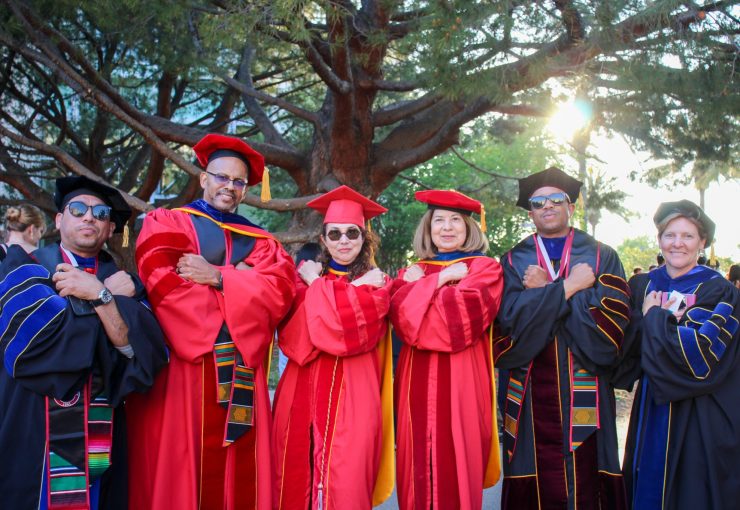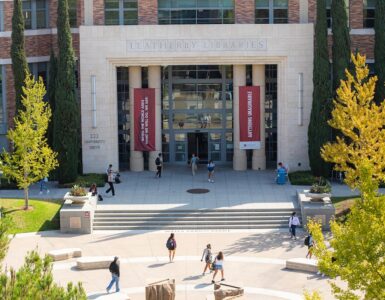Candidates and graduates of Chapman University’s Ph.D. in education program all joined the program to impact the lives of students.
Beyond that, their reasons for pursuing a Ph.D. are very personal for each of them.
“We look for someone who is not doing it for three letters after their name,” says Keith Howard, associate dean for academic affairs at Attallah College of Educational Studies and director of the Ph.D. program. “We look for someone who has a personal mission and purpose for educating folks.
“They may have had a good experience with an educator and wish to pay it forward. Or maybe they had a bad experience that they would like to prevent others from duplicating. Perhaps they would like to do research that asks the right questions to improve education.”
Why a doctor of education?
Rodney Hume-Dawson (Ph.D. ’17) wanted to get a doctorate in education to study the stigma and resilience of disability.
“I also wanted to understand if my experiences were similar or different from others with similar disabilities,” says Hume-Dawson, who has lived with impaired mobility caused by polio for most of his life. “So, for me, the pursuit of the Ph.D. was first and foremost a personal one, and as I got more into the work, I started visualizing how I could change hearts and minds about disability.”
Hume-Dawson, who teaches in the education and liberal studies departments in the College of Education and Integrative Studies at Cal Poly Pomona, chose disability studies – one of the program’s five emphases – as his focus.
“I wanted to truly understand disability from an academic and intellectual perspective, not just from what I had been told about disability or had experienced living with a disability,” he says.
Maryann Krikorian (Ph.D. ’16) joined the program because of her experience as a first-generation student and woman of color.
She held multiple jobs and internships pursuing her bachelor’s and master’s degrees “while competing with students of higher economic and human resources for grades, merit and recognition in pursuit of the ‘American dream,’” she says.
At the same time, a family member’s serious illness left her vulnerable to anxiety and depression. She later became a doctor of education – with an emphasis in culture and curricular studies – to support other multidimensional learners and to practice an educational approach to each learner as a whole person, she says. She is now an associate professor at Loyola Marymount University’s School of Education and academic director of its master of arts in transformative education program.
Ph.D. candidate Nick Irwin (MLD ’17) wants to support student veterans. He is using Associate Professor Whitney McIntyre Miller’s peace leadership model in his dissertation, with a leadership emphasis.
“I wanted to see and utilize integral peace leadership as a framework to help student veterans to be able to transform any blockages toward peace,” says Irwin, who retired from the military this year.
Drawing on 20 years in the Navy, he developed a five-week program for student veterans as part of his research and offered it this summer.
‘We prepare teachers of teachers’
The Ph.D. program’s teacher education emphasis prepares students for roles as future faculty in teacher preparation programs and to conduct original research, Howard says.
“These are folks required to create new knowledge contributing to the current body of research literature as part of their doctoral program experience,” he says.
The research-based program, which was Chapman’s first doctorate, is primarily geared toward preparing students to work as faculty in higher education – although many candidates are interested in other areas of education.
“We prepare teachers of teachers,” says Howard, whose wife Nicol earned her doctorate through the program in 2015 and serves as dean of the University of Redlands’ School of Education. “We want folks who have not only been teachers but who have also been outside the classroom and can bring research experience. That’s who we think make the best professors.”
One of the program’s differentiators is, instead of three pre-dissertation written qualifying exams, there are two exams and a “scholarly engagement” requirement – which includes writing articles, teaching classes, writing a syllabus or guest lecturing, Howard says.
“That’s purposeful because when our graduates interview for faculty positions at other universities, they are expected to have some of these experiences,” he says.
Ultimately, candidates develop new ways of thinking about issues and solving problems in the field of education.
“We look for equitable approaches to education – we want to impact the field such that inequities that we know exist in education, whether it be in K-12 education, higher education, special education, school counseling – we remove those inequities and give everyone a fair chance at being successfully educated,” says Howard, who taught middle school before coming to higher education.
Doctoral candidates have a faculty adviser who helps them find what they want to research. They learn in a small cohort and are a five-minute drive from two large school districts.
“We teach research productivity … and I think we get opportunities to know folks better,” Howard says.
Advocating for learners
Krikorian, who received the Term Faculty Distinguished Teaching Award from Loyola Marymount this year, says the program’s faculty were supportive and rooted in diversity, equity and inclusion. The program gave her the theoretical framework and space to process her own academic experiences and explore a holistic approach to education, “before concepts like trauma-informed education and social-emotional learning gained popularity.”
“My time at Chapman positions me well to advocate for learners as integrated whole beings, creating space for healing and humanity for the generations to come,” she says.
Hume-Dawson says he always loved learning, and the program was “transformative” for him.
“It was not just an academic experience; it was a spiritual rebirth,” he says. “I literally changed my perceptions and understanding of disability and education in America.”
“The program helped me with the choice of what is taught in the classroom, the importance of a vibrant curriculum that is transformative and the essence of understanding how knowledge production works,” he says. “I want to impact the younger generation to be activists and people who can transform minds and souls.”




